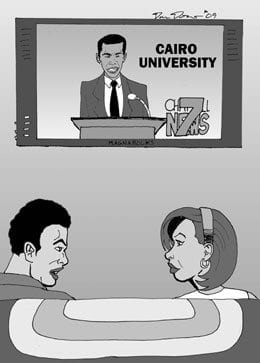
Restoring America’s leadership
Barack Obama’s June 4, 2009, speech at Cairo University in Egypt was well-received around the world. The president called for “… a new beginning between the United States and Muslims around the world … based on mutual interest and mutual respect.” He indicated that this could be accomplished through “… a sustained effort to listen to each other; to learn from each other; to respect one another; and to seek common ground.”
Obama was aware that much of the hostility toward America in the Middle East stems from the belief that America is partial to Israel in the dispute over Palestine. Unequivocally, Obama asserted, “America’s strong bonds with Israel are well known. This bond is unbreakable. It is based upon cultural and historical ties, and the recognition that the aspiration for a Jewish homeland is rooted in a tragic history that cannot be denied.”
Nonetheless, Obama made it clear that he supports a two-state solution to the Arab-Israeli conflict. “[Palestinians] endure the daily humiliations … that come with occupation,” he said. “So let there be no doubt. The situation for the Palestinian people is intolerable. And America will not turn out backs on the legitimate Palestinian aspiration for dignity, opportunity, and a state of their own.”
Until Sunday, Israeli Prime Minister Benjamin Netanyahu opposed a two-state solution for the region and has supported the development of settlements on the West Bank. The adamant U.S. policy expressed by Obama has forced Netanyahu to modify Israel’s position. It is immoral for Israelis to deny the right of return to Muslims who have fled Israel while the government pursues a policy of occupying Arab lands.
With the Cairo speech, Obama seems to have reasserted the leadership of the United States in world affairs. More moderate politicians were successful in the recent elections in Lebanon. And all of a sudden, the citizens of Iran turned out in the streets to campaign against Mahmoud Ahmadinejad, a strong opponent of the United States.
Criticism of Obama’s speech came from al-Qaida leaders who fear the president’s charisma, and from strong supporters of Israel who do not want Arab abuses against Jews to be ignored. However, it is important to understand that a call for diplomacy is not the time or place to be overly critical or insulting.
For the first time since the Camp David Accords in 1978 between President Anwar Sadat of Egypt and Prime Minister Menachem Begin of Israel, there is a renewed sense that there might be a resolution of the Arab-Israeli conflict.
Change agent?
In his campaign for the White House, Barack Obama relied heavily on the theme of “change.” He had discovered that voters are eager for a more responsive and open government.
Other candidates have adopted that theme, but it is difficult for a longtime incumbent to be convincing as a change candidate. After more than 16 years in office, Mayor Thomas M. Menino can hardly be considered an agent of change. But he has discovered a solution to the problem — simply adopt the proposals of his mayoral rivals who are calling for change.
When City Councilor-at-Large Michael F. Flaherty proposed increasing the number of charter schools, Menino changed his position. He even adopted City Councilor-at-Large Sam Yoon’s idea to increase funding for more successful charter schools. Several proposals by Kevin McCrea, the South End developer who is running for mayor, were also added to Menino’s “to-do” list.
However, Menino’s approach is risky. Either his new proposals are intended to correct the obviously flawed policies of his administration or they merely constitute cynical pandering for votes. It is up to the people to decide which.






